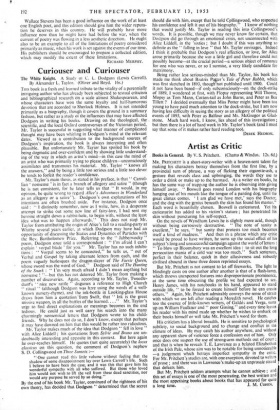Artist as Critic
Books in General. By V. S. Pritchett. (Chatto & Windus. 12s. 6d.) MR. PRacuErr is a short-story-writer with a heaven-sent talent for making his characters betray themselves from the first line, by a provincial turn of phrase, a way of flicking their cigarette-ash, a gesture that reveals class and upbringing, the words they use to order a drink or make up to the barmaid. As a writer on books, he has the same way of trapping the author he is observing into giving himself away. " Boswell goes round London with his biography hanging out of his mouth like the tongue of a panting dog, until the great climax comes. ' I am glad we have met,' says the Doctor, and the dog with the genius beneath the skin has found his master." Each word is beautifully chosen. Boswell is caricatured. Yet his caricaturist has added to his victim's stature ; has penetrated his skin without puncturing his self-respect.
On the novels of Wyndham Lewis he is slightly more acid, though without being corrosively destructive. " The note of sanity is excellent," he says, " but sanity that protests too much becomes itself a kind of madness." And then in a phrase which any critic would be proud to have written, he sums up the social effect of his subject's long and unsuccessful campaign against the world of letters : " To blow up Bloomsbury was an excellent idea : to sit out the long persecution mania of a cold war was too much." Such sentences, perfect in their balance, quick in their allusiveness and robustly civilised abound in these three dozen reprinted essays.
But Mr. Pritchett is not content to let off fireworks. The light he blindingly casts on one author after another is that of a flash-lamp, which throws unexpected features into disproportionate prominence, at the same time obscuring the profile we had expected to see. Henry James, with his notebooks in his hand, appeared to stand outside life, " to be forced to create himself before he can create others." Again, Mr. Pritchett admirably conveys the sense of strain with which we are left after reading a Meredith novel. He catches too the essence of little-known writers, of Galan and Verga, sums up on William Faulkner and " poor Gissing," and every time leaves his reader with his mind made up whether he wishes to embark on their books himself or will take Mr. Pritchett's word for them.
His criticism has a liberal breadth. He is sensitive to psychological subtlety, to social background and to change and conflict in the climate of ideas. He may catch his author anywhere, and without any apparent show of violence force a confession out of him. Only once does one suspect the use of strong-arm methods out of court ; and that is when he reveals T. E. Lawrence as a belated Elizabethan of the Irish Pale, whose aim was to be notable for being unnoticeable —a judgement which betrays imperfect sympathy in the critic. For Mr. Pritchett's studies are, with one exception, devoted to writers of prose ; and there was in Lawrence's make-up an unprosaic strand that- defeats. him. . But Mr. Pritchett seldom attempts what he cannot achieve ; and this set of essays is one of the most penetrating, the best written and the most appetising books about books that has appeared for quite


































 Previous page
Previous page